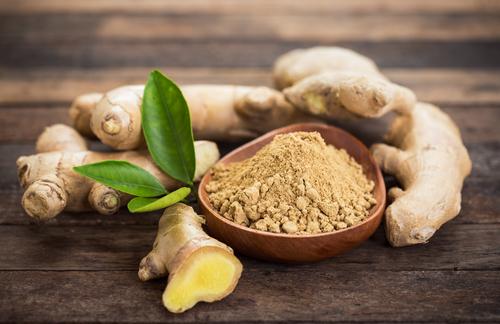
7 Ginger Health Benefits—Boosts Brain Function, Reduces Stomach Cramps, Improves Blood Sugar, Lowers Cholesterol and More
Ginger (Zingiber officinale) is a flowering herb loved by cultures, cooks, and foodies around the world. Its plant family members include spice-rack all-stars like cardamom and turmeric. Primarily used for its root (rhizome), ginger is one of the most commonly consumed dietary condiments—and for good reason. Check out ginger's powerful one-two punch:
- It adds distinctive zesty flavor to a variety of dishes from breakfast through dinner—including this simple ginger and key lime elixir.
- It's packed with antioxidants and anti-inflammatory nutrients—including potassium, zinc, riboflavin, magnesium, phosphorus, and Vitamin C, B3, and B6—which provide a wide range of health benefits.
Ginger is so promising for human wellness that it has "spiced" the interest of culinary fans and doctors alike. We looked into the research to find out exactly why adding more ginger to your diet is good for you and your family...aside from making your home-cooked meals taste better.
Science Says: 7 Evidence-Based Benefits of Ginger
1. Improves Blood Sugar
Bad things happen when blood sugar levels get too high and stay too high, including an increased risk for heart disease, chronic inflammation, and diabetes. But a 2015 study published in the Iranian Journal of Pharmaceutical Research found that supplementing with 2 grams of ginger powder per day reduced fasting blood sugar levels by as much as 12% in people with type 2 diabetes. Ginger supplementation also improved a related biomarker called HbA1C, which tells you how well your blood sugar is controlled over time.
2. Eases Nausea, Motion Sickness, and Indigestion
Ginger's ability to fight indigestion and upset stomach is one of its most long-celebrated uses. The herb is considered a safe and effective way to relieve nausea caused by indigestion, motion sickness, and chemotherapy. Just 1 to 1.5 grams of ginger is an effective dose.
3. May Reduce Cancer Risk
Raw ginger contains an anti-inflammatory compound called 6-gingerol which may protect against certain types of cancer, including colorectal cancer, breast cancer, and pancreatic cancer. The research on this is relatively limited though, so it needs to be studied more extensively.
4. Relieves Pain
Clinical trials, including a 2001 randomized, double-blind, placebo-controlled study published in Arthritis and Rheumatism, show that supplementing with ginger can reduce pain and dysfunction caused by osteoarthritis (chronic joint inflammation).
Another 2009 study involving 150 female participants found that taking 1 gram of ginger powder per day during the first three days of menstruation reduced cramps as effectively as pain-relieving drugs like ibuprofen.
And a 2010 paper published in the aptly named Journal of Pain found that physically active adults who consumed 2 grams of raw or heat-treated ginger per day experienced up to a 25% decrease in exercise-induced pain, which suggests that this herb could help athletes "spice up" their training and gain a competitive edge.
5. May Protect Against Alzheimer's Disease
Alzheimer's disease and other types of dementia are related to inflammation and oxidative stress. Because ginger contains both antioxidant and anti-inflammatory bioactive compounds, the herb may protect against these common age-related conditions. At least one animal study supports this hypothesis.
Ginger may also be effective for boosting cognitive function, as seen in a 2012 study published in Evidence-Based Complementary and Alternative Medicine. In this study, healthy middle-aged women from Thailand showed better memory and reaction time (compared to a placebo group) after supplementing with either 400 mg or 800 mg of ginger per day for two months.
6. Improves Cholesterol Levels
Remember the 2015 study which showed ginger supplementation improves blood sugar levels? The same study also found that consuming 2 grams of ginger per day for just 12 weeks improves cholesterol markers, including ApoB/ApoA-I ratio and oxidized lipoprotein levels.
An earlier double-blind controlled study published in Saudi Medical Journal revealed that taking 3 grams of ginger per day lowered triglycerides, LDL cholesterol, and total cholesterol. Ginger's beneficial effects on cholesterol has major implications for preventing heart disease, which is currently the leading cause of death for men and women.
7. Fights Infections
6-gingerol—which may explain ginger's potential cancer-protective properties—can fight various types of infections, too. The antibacterial and antiviral compound protects against drug-resistant bacteria, oral bacteria that causes gum disease, and a leading cause of viral respiratory infections.
The Bottom Line
With so many forms to choose from—including freshly chopped, dried and powdered, or even steeped as a tea—ginger is easy to add into your daily diet. And there are plenty of research-based reasons why you'd want to!
Interested in adding natural herbal remedies to your healthy lifestyle? Explore our herb shop for a wide range of nutritious options, and be sure to check out the rest of our blog for updated natural wellness news.
https://www.healthline.com/nutrition/11-proven-benefits-of-ginger
https://www.cdc.gov/heartdisease/facts.htm
https://www.ncbi.nlm.nih.gov/books/NBK92775/
https://www.medicalnewstoday.com/articles/265990.php
https://health.clevelandclinic.org/why-ginger-gives-you-more-than-zesty-flavor-infographic/





.png?v=14052428765372906161746588027) Previous Post
Previous Post
%20copy.png?v=62173825240595680121746588027)